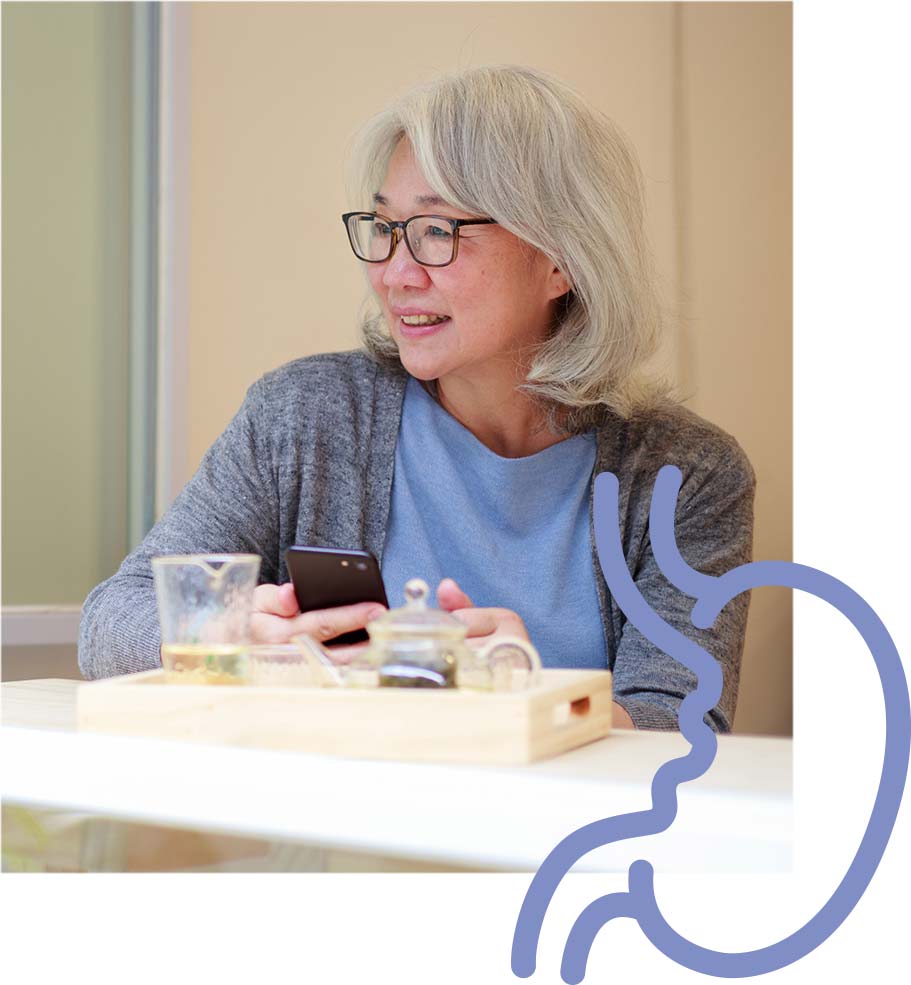If you or a loved one have received a stomach cancer diagnosis, you may be exploring various treatment options. Navigating the journey to recovery can be overwhelming, so our goal is to help you feel empowered throughout the process

From Diagnosis to Triumph
Find hope in advanced radiation therapy to treat stomach cancer
People suffering from stomach cancer may be uncomfortable due to feeling bloated or having indigestion or nausea, but they may also experience more severe symptoms like extreme heartburn or stomach pain.
If you have been diagnosed with stomach cancer, you want treatment to begin and the pain to end. Let the compassionate team of radiation oncologists at Akumin help you today. Our team of physicians are experienced in treating stomach cancer with radiation therapy.
Whether it is explaining treatment options, or discussing possible side effects, our medical experts are here for you in your fight against stomach cancer.
If you have been diagnosed with stomach cancer, you want treatment to begin and the pain to end. Let the compassionate team of radiation oncologists at Akumin help you today. Our team of physicians are experienced in treating stomach cancer with radiation therapy.
Whether it is explaining treatment options, or discussing possible side effects, our medical experts are here for you in your fight against stomach cancer.
Benefits of Radiation Therapy for Stomach Cancer
Radiation therapy is a proven treatment option with a low risk of complications

Learn About Stomach Cancer
Stomach cancer is the 5th most common cancer worldwide
Stomach cancer, also called gastric cancer, begins when cells in the stomach start to grow out of control. Stomach cancers tend to develop slowly over many years. Before cancer develops, pre-cancerous changes often occur in the inner lining of the stomach. These early changes rarely cause symptoms, so they often go undetected.
According to the American Cancer Society, stomach cancer mostly affects older people, with the average age of diagnosis being 68. In addition, the lifetime risk of developing stomach cancer is higher in men (about 1 in 96) than in women (about 1 in 152).
Radiation therapy can be used in different ways to help treat stomach cancer. For some earlier-stage cancers, radiation can be used before surgery to try to shrink the cancer and make it easier to remove. After surgery, radiation therapy can be used to try to kill any cancer cells that weren't removed during the surgery. For cancers that can't be removed by surgery, radiation therapy can sometimes be used to help slow the growth of the cancer and ease symptoms, such as pain, bleeding, or eating problems.
According to the American Cancer Society, stomach cancer mostly affects older people, with the average age of diagnosis being 68. In addition, the lifetime risk of developing stomach cancer is higher in men (about 1 in 96) than in women (about 1 in 152).
Radiation therapy can be used in different ways to help treat stomach cancer. For some earlier-stage cancers, radiation can be used before surgery to try to shrink the cancer and make it easier to remove. After surgery, radiation therapy can be used to try to kill any cancer cells that weren't removed during the surgery. For cancers that can't be removed by surgery, radiation therapy can sometimes be used to help slow the growth of the cancer and ease symptoms, such as pain, bleeding, or eating problems.
A Non-Invasive Solution for Stomach Cancer
Advanced radiation therapies can help reduce pain and increase survival rates
Relief From Pain
Radiation treatment has proven successful in reducing the pain caused by stomach cancer. By focusing on the cancerous tissue and shrinking it, pressure on surrounding areas is also relieved, leading to less discomfort
Radiation treatment has proven successful in reducing the pain caused by stomach cancer. By focusing on the cancerous tissue and shrinking it, pressure on surrounding areas is also relieved, leading to less discomfort
Increased Survival Rates
Radiation therapy can be paired with other treatments to improve survival rates and slow down the development of the disease. By taking a comprehensive approach to treating stomach cancer, better results and a longer survival time can be achieved
Radiation therapy can be paired with other treatments to improve survival rates and slow down the development of the disease. By taking a comprehensive approach to treating stomach cancer, better results and a longer survival time can be achieved
Better Quality of Life
Radiation therapy can enhance the quality of life for stomach cancer patients by reducing symptoms such as pain, nausea, and vomiting. This allows patients to feel more comfortable and more capable of participating in the activities they love
Radiation therapy can enhance the quality of life for stomach cancer patients by reducing symptoms such as pain, nausea, and vomiting. This allows patients to feel more comfortable and more capable of participating in the activities they love
Book Appointment
Complete the form below to request an appointment or consultation. To view a list of offerings in your area visit our locations page.
Schedule a Consultation
Complete the form below to schedule a consultation. To view a list of offerings in your area visit our locations page.
Appointment Type:
Please enable JavaScript in your browser to use the Online Booking Form
Experience the Akumin Advantage
Radiation Therapy, Expertise, and Support
Advanced Radiation Therapy
Our centers offer advanced technologies including (IMRT) and (3D-CRT), to provide safe and effective treatment options for patients with stomach cancer
Expert Team of Specialists
Our teams of experienced oncologists, radiologists, and other specialists are dedicated to supporting our patients with expert care and compassion
Personalized Care
We always take a patient-centered approach to providing care, designing treatment plans tailored to the specific needs and preferences of each individual